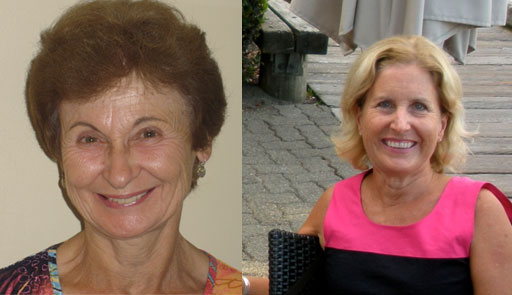Mothers are not alone when it comes to breastfeeding
Submitted by Sheliza Thobani, Communications and Public Affairs
Not only has breastfeeding shown a decline in illnesses such as respiratory infections, type-one diabetes, and multiple sclerosis, but it helps to strengthen the bond between mother and baby.
Margot Scott, Lactation Consultant, and Anne Morgan, Public Health Nurse, work to ensure that mothers can solve any breastfeeding challenges. “I enjoy helping new mothers realize they can receive pleasure and satisfaction from breastfeeding,” says Margot.
The breastfeeding clinics within Pacific Spirit Community Health Centre and Robert and Lily Lee Community Health Centre, focus on breastfeeding, while providing social and emotional support to mothers. “During the appointment we are able to assess the baby’s latch, provide ways to put breast milk into bottles, and offer suggestions as to how breastfeeding might be improved or answer any concerns,” says Anne. “Sore nipples are very common, and hopefully we can treat the latch before tissue breakdown happens.”
After the scheduled one-hour appointment, some mothers require a follow-up. Both Margot and Anne partake in home visits, in addition to sessions at the clinics. They talk about how it works – physically and emotionally – and address any problems mothers may be experiencing. According to Anne, “many mothers know the problem, and even look it up on the Internet, so they just want validation to know what they are doing is right.”
More about the breastfeeding clinics:
Clinics are free of charge and available to anyone within the VCH region. Services are provided in-person or over the phone. For more information, visit Breastfeeding on VCH’s website.
* September 29, 2012 is the World Breastfeeding Challenge and Celebration – The challenge is to have the most children breastfeeding at 11AM!



Linda Davis
I was so happy to see an article about PHN’s promoting breastfeeding. I was very surprised to see the nurse holding a bottle. This picture is a mixed message. I hope a correction is made for this article showing a picture with a PHN assisting a mother with breastfeeding.
Editor
Thanks for your comment Linda. You probably saw the photo that was pasted into the e-mail version of VCH News that was sent out on September 6th. A correction was made and the photo was changed that same day in the article itself, which can be viewed here http://vchnews.vch.ca/category/spotlight/ Unfortunately we have no way to change the photo in the email version once it’s been sent out.
Mercedes Flores
I like the response this article has generated. If the bottle had not been depicted in the picture would we be having this dialogue? Maybe not or it might look totally different. Any discussion about breastfeeding is a good discussion, yes I agree about the picture not matching the subject of breastfeeding as I am a breastfeeding advocate but I respect peoples choices and abilities. I feel for Ali’s experience and I agree with Terri Betts.
For anyone out there who is having difficulty with breastfeeding call your Community Health Centre ask to speak to a Public Health Nurses as we are ready and capable to help.
I have told my clients to think of breastfeeding as a dance between mom and baby, the more you practice the better it gets.
terri betts
It breaks my heart to read Ali’s comments.
I’m not sure who is responsible for spreading this myth that breastfeeding is “supposed to come naturally!” It’s another one of those things in life that is simple, but definitely not easy. Someone, ideally in the first few hours and days after your baby is born, has to show you, and reinforce, what normal breastfeeding looks like and feels like. It’s not something (like breathing) that we’re born knowing how to do.
It requires a lot of persistence on the part of the mom, encouragement from someone (health professional or family members or friends) who knows how it’s done, and unwavering support from a committed partner, speaking from experience! But if you keep going, past the initial discomfort that happens even if you’re doing it right, it becomes a very rewarding experience. You get to enjoy the knowledge that it’s good for you and your baby’s health, it’s comforting for you and your baby, helps you lose your pregnancy weight, and is way less expensive and more convenient than bottle feeding.
I have friends and family members who have and haven’t been successful, even though all started out wanting to breastfeed. I don’t think it’s appropriate to judge anyone who bottle feeds their baby, because there can be all sorts of reasons why it became necessary. I didn’t like being made to feel self-conscious when I breastfed my daughter in public, so we should all be mindful of not making mothers feel self-conscious about bottles, either.
Editor
The photo has been changed. You can view it here: http://vchnews.vch.ca/
Thanks.
Shereen Russell
It does not appear that the photo on the front page has changed. I completely agree with Sandra and Kathy. Seeing the bottle in this photo does not indicate to me that breastfeeding is supported despite what is written in the article.
Ali
I think there needs to be more acknowledgement that breast feeding can be incredibly difficult, and rarely “just happens”. I have known so many new moms who have been upset beyond belief that they can’t do what “is supposd to come naturally” And from what I’ve heard from friends within Vancouver, if you can’t or are having trouble breastfeeding or choose not to they felt very little support from the community, and were often made to feel ashamed if they used a bottle. I find it amazing that VCH can be so positive when it comes to drug use and harm reduction, and yet (from ancedotal evidence, admittedly) is so negative when it comes to the hardships of breastfeeding.
Trudi
I am one of those moms for whom breastfeeding never “just happened.” Despite weeks of trying, many lactation consultations, sleepless nights and bloodied nipples, I gave in to the bottle and formula despite the fact that I was surrounded by people who equated my decision to something resembling abuse. Although breastfeeding is best, women should not be made to feel like failures when they’re at their most vulnerable and exhausted during those first few weeks after baby’s arrival. I’m happy to report that my children (now 5 and 6) are healthy, happy and well adjusted…despite being bottle-fed babies.
Editor
Thanks for the comments folks. It’s good to see people are reading the newsletter. The photo including both breastfeeding and a bottle, was specifically chosen by the writer to illustrate that bottles have a place in breastfeeding, and that using breast milk in a bottle is one way to overcome certain challenges that can come up. I believe this is alluded to in the article. Clearly the photo didn’t communicate that to most viewers. So much for a picture says a thousand words! We’ve changed the photo now, as you can see.
Rachel Douthwaite
Dear editor,
As you implied, “a picture is worth a thousand words”. What the picture selected for this article says to prospective and new mothers is “you are going to fail at breastfeeding so make sure you have bottles”. As an experienced Public Health Nurse, International Board Certified Lactation Consultant, and breastfeeding mother, I am well aware of the challenges that establishing breastfeeding can present for mothers. This makes it all the more important to demonstrate that success is possible with the right support.
Vancouver Coastal Health states in its strategic direction “We will focus on effectiveness, efficiency, best practices and health outcomes…” Best practice in infant feeding is exclusive breastfeeding and an article about the subject should reflect that.
Editor
I must agree that the photo originally chosen did not say “this is breasftfeeding when it’s going well”. But then wasn’t that kind of the point? Note that that the premise of the article is that breastfeeding can come with challenges and that supports are available. The original photo certainly did draw attention to the article and to the topic!
As mentioned, the photo was changed to something that portrays breastfeeding when it’s going well. You can view it here: http://vchnews.vch.ca/wp-content/uploads/2012/09/Breastfeeding-Spotlight2.jpg
Lisa Yeates
Great information about these clinics! I would hope in the future the photo that is attached to the article that was sent in the Newsletter had an image of a breast feeding mother and not one of a woman holding a baby bottle. I think we need to use imagery that supports a woman’s choice to breast feed by using actual images of breast feeding.
Thanks!
Kathy Griffiths
How inappropriate to have the front picture with a “medical person” holding up a bottle to give the baby, when the article is about breastfeeding?!!! Who did this ridiculous thing? Really? didn’t anyone proofread the article? Very sad to see this. For all the hard work that Public Health nurses do to try to promote breastfeeding this certainly doesn’t help the cause.
Sandra Grant
It is curious and disappointing that the photo on the main page associated with this BF article shows a nurse holding a bottle.